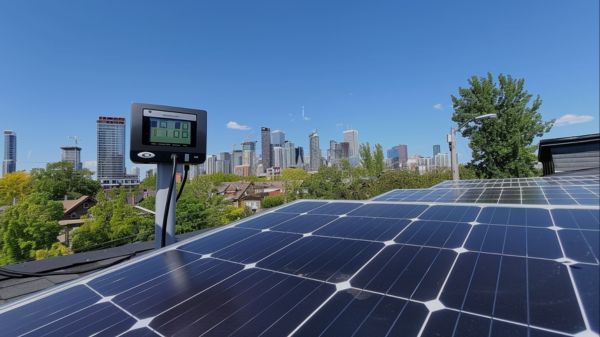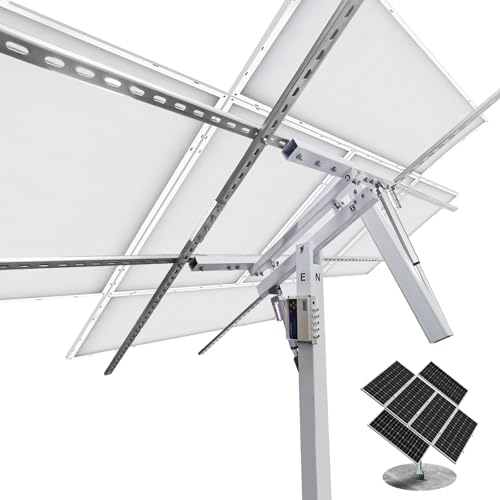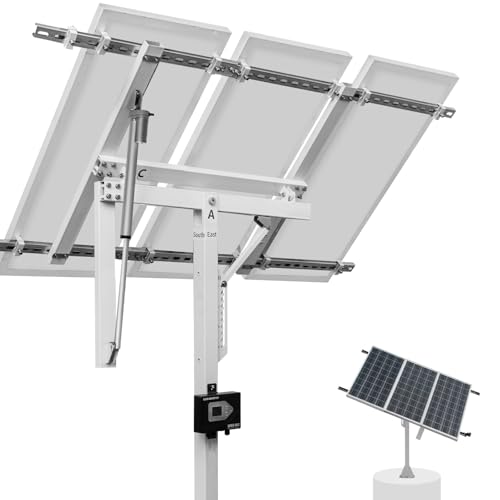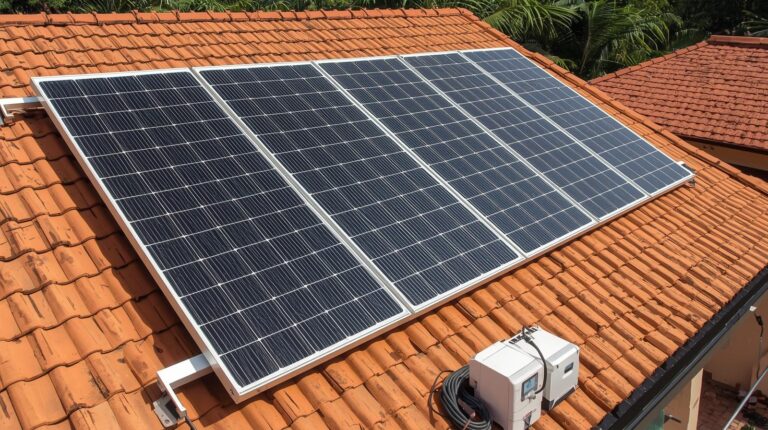Producing 1 kilowatt of solar energy involves a detailed cost breakdown. The expenses include solar panel costs varying with type and efficiency, inverter expenditures related to functionalities and monitoring systems, installation charges driven by labor and equipment, permit and inspection fees influenced by local regulations, and maintenance fees essential for system longevity.
Additionally, considering efficiency factors, financial incentives, and rebates play a significant role in the total expenditure analysis. Each component and aspect contribute to the overall cost of producing 1 kilowatt of solar energy, illustrating the multifaceted nature of solar energy production costs.
Key Takeaways
- Solar panel and component costs vary based on type, efficiency, and market trends.
- Inverter and monitoring system expenses depend on type, efficiency, and brand reliability.
- Labor costs, installation techniques, and equipment affect overall solar energy production expenses.
- Permit, inspection, and compliance fees impact the budget for solar energy system installation.
- Maintenance, repair, and financial incentives influence the long-term cost of solar energy production.
Solar Panel Costs
When it comes to the cost of producing 1 kW of solar energy, one significant factor to take into account is the expense associated with solar panels. The cost of solar panels varies based on factors such as the type of solar panel and its efficiency.
Here’s what you need to know about solar panel costs:
- Solar Panel Types: There are different types of solar panels available in the market, including monocrystalline, polycrystalline, and thin-film solar panels. Each type has its own set of characteristics and costs associated with it.
- Solar Panel Efficiency: Solar panel efficiency refers to the amount of sunlight that a solar panel can convert into electricity. Higher efficiency panels are usually more expensive but can generate more electricity in limited space.
When considering the cost of producing solar energy, it’s important to weigh the upfront expenses of different solar panel types against their efficiency to determine the best option for your specific needs.
Inverter Expenses
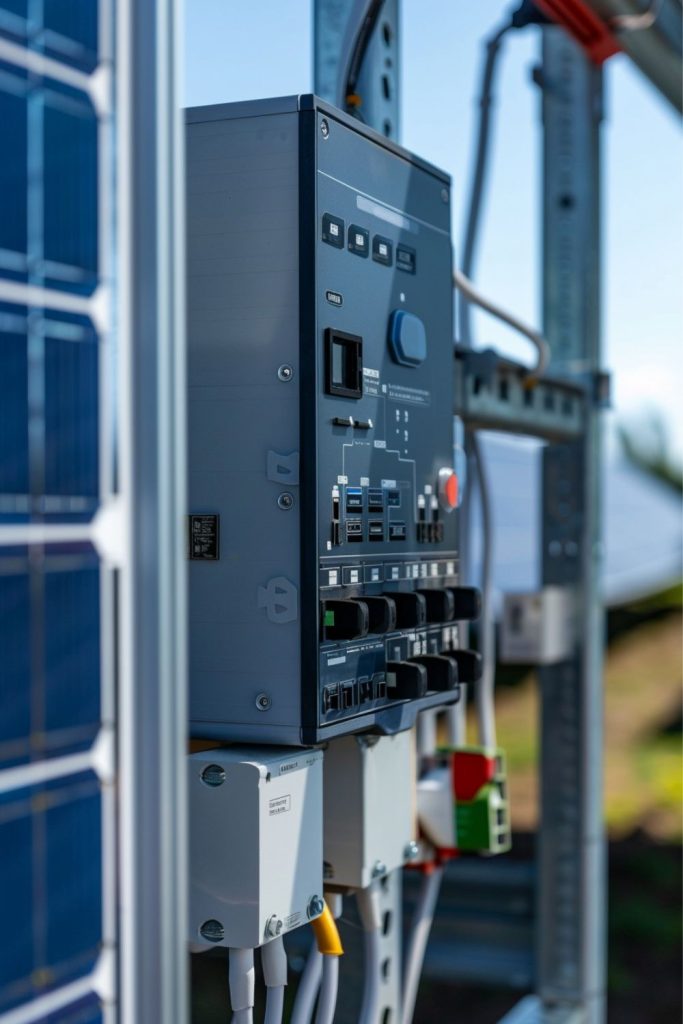
To effectively harness solar energy, another vital component to take into account is the expense related to inverters. When considering inverter expenses, there are several significant factors to keep in mind:
- Inverter Types: Different inverter technologies exist, such as string inverters, microinverters, and power optimizers, each with varying costs and functionalities.
- Inverter Lifespan: Understanding the lifespan of inverters is essential, as it impacts long-term maintenance and replacement costs.
- Inverter Efficiency: Higher efficiency inverters may come at a higher initial cost but can lead to greater energy production and savings over time.
- Inverter Brands and Warranties: Choosing reputable inverter brands with solid warranties can provide peace of mind and protection against unexpected malfunctions.
- Proper inverter installation and regular maintenance are vital to guarantee peak performance and longevity of your solar energy system. Efficiency optimization plays a crucial role in maximizing energy production and minimizing energy loss during the conversion process.
Mounting and Racking Costs

Considering the installation of solar panels, one important aspect that impacts the overall cost is the expenditure associated with mounting and racking. When setting up a solar energy system, the choice of mounting materials and racking systems plays a significant role in the success of the installation.
Various installation techniques must be considered to guarantee the structural integrity, weather resistance, and load capacity of the system. Whether opting for ground mounts, roof mounts, or tracking systems, each option comes with its own set of advantages and costs.
Structural considerations are essential to secure the longevity and efficiency of the solar panels. Additionally, aesthetic options are available to cater to different preferences and architectural requirements.
The cost of mounting and racking can vary based on the chosen system’s complexity and specifications. It’s important to invest in high-quality materials and systems to guarantee the durability and performance of the solar energy setup over time.
Installation Charges
When considering the cost of producing 1 Kw of solar energy, it’s important to account for installation charges.
Labor costs play a significant role in the overall expenses, as skilled professionals are required to set up the solar panels efficiently.
Additionally, equipment expenses like mounting hardware and wiring contribute to the total installation charges.
Labor Costs
Solar energy installation charges, also known as labor costs, can greatly impact the overall cost of producing 1 Kw of solar energy.
When considering labor costs for solar energy installation, several factors play a significant role in determining the final expenses:
- Labor Market: The current state of the labor market can influence the availability of skilled workers for solar energy installation projects.
- Skill Requirements: The specific skills and expertise needed for installing solar panels can affect the labor costs associated with the project.
- Training Programs: Access to training programs that provide the necessary skills for solar energy installation can impact labor costs.
- Wage Trends: Fluctuations in wage trends within the solar energy industry can have a direct effect on labor costs for installing solar panels.
Ensuring compliance with safety regulations, optimizing labor productivity, and identifying the most suitable job roles within the workforce are essential considerations when calculating labor costs for producing solar energy.
Equipment Expenses
To accurately gauge the cost of producing 1 Kw of solar energy, it is essential to explore the domain of equipment expenses, particularly installation charges. When considering solar technology advancements and energy storage solutions, the expenses related to the equipment used play a significant role in the overall cost.
Installation charges encompass various components, and being aware of these costs can help you make informed decisions when investing in solar energy. Below is a breakdown of potential equipment expenses you may encounter:
| Equipment | Cost ($) | Description |
|---|---|---|
| Solar Panels | 1,000 – 5,000 | Prices vary based on quality and quantity |
| Inverter | 500 – 2,000 | Converts DC electricity to AC |
| Mounting Structure | 500 – 2,000 | Supports and positions the solar panels |
| Electrical Wiring | 300 – 1,000 | Connects the solar panels to the system |
Understanding these installation charges can aid you in estimating the total cost of producing 1 Kw of solar energy.
Permit and Inspection Fees
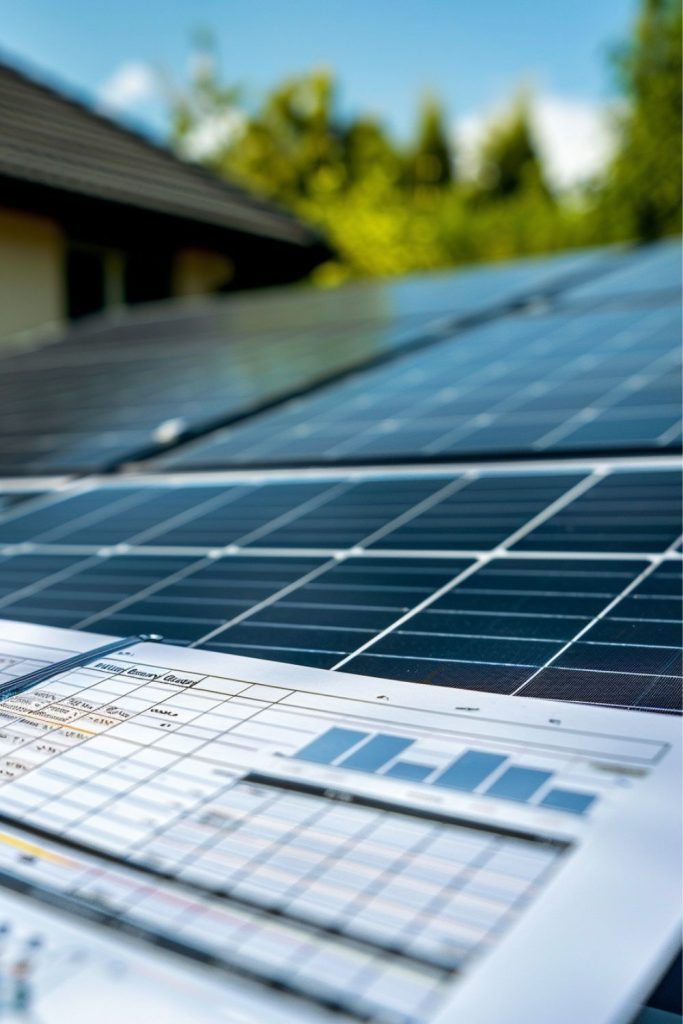
Steering the process of obtaining permits and scheduling inspections for your solar energy project can greatly impact the overall cost of production.
When delving into the domain of permit and inspection fees, it’s important to take into account various factors that play a significant role in determining the total expenses.
Here are some key points to keep in mind:
- Zoning Regulations: Understanding the specific zoning regulations in your area is crucial to guarantee compliance and avoid costly delays.
- Inspection Requirements: Familiarize yourself with the inspection requirements mandated by local authorities to facilitate a smooth process.
- Permit Applications: Thoroughly completing permit applications is important for obtaining the necessary approvals efficiently.
- Compliance Costs: Factor in compliance costs associated with meeting regulatory standards to accurately gauge the overall expenses.
Wiring and Electrical Costs
When it comes to the cost of producing 1 Kw of solar energy, wiring and electrical expenses play a significant role. You need to evaluate the wiring installation costs, including the labor and materials required. Additionally, electrical component expenses, maintenance fees, and repair costs should also be factored into your overall budget calculation.
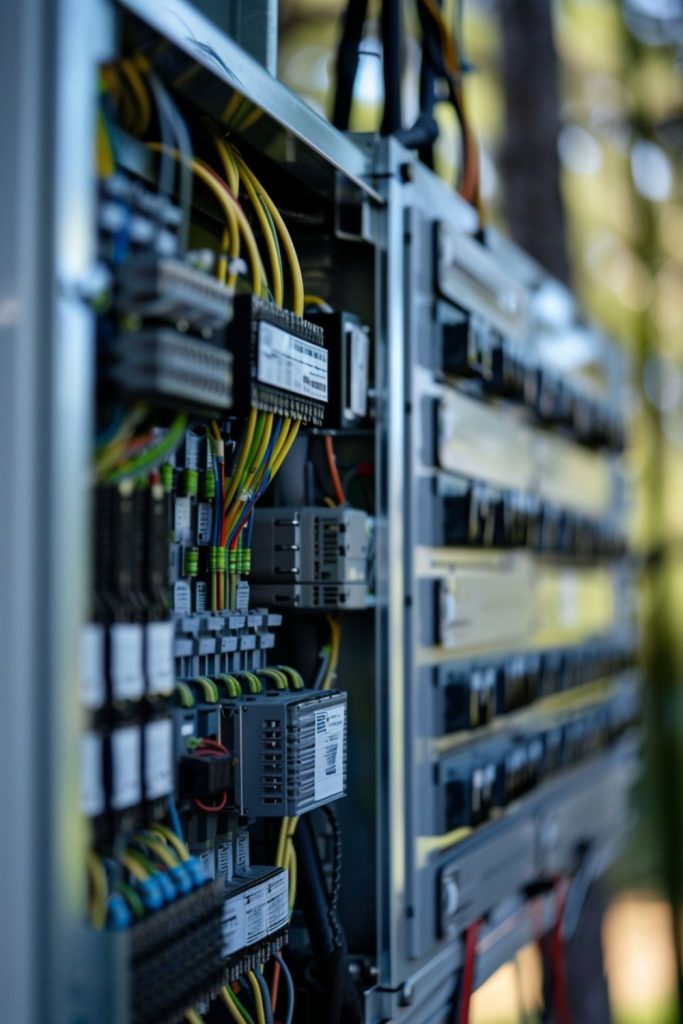
Wiring Installation Expenses
Installing the wiring for a solar energy system involves essential steps that directly impact the overall cost of producing 1 Kw of solar energy. When considering wiring installation expenses, there are several factors to take into account:
- Wiring Materials: The type and quality of wiring materials used can influence both the upfront cost and long-term performance of the solar energy system.
- Installation Techniques: Efficient and proper installation techniques not only guarantee the safety of the system but also impact the overall cost by reducing the need for repairs or replacements in the future.
- Labor Costs: Skilled labor for wiring installation may come at a higher price but can result in a more reliable and durable solar energy system.
- Permitting and Inspection Fees: These additional costs are essential for confirming that the wiring installation meets all the necessary regulations and standards, adding to the overall expense of the solar energy project.
Electrical Component Costs
Electrical component costs, particularly those associated with wiring and electrical components, play a significant role in determining the overall expenses of a solar energy system. When considering the electrical components for your solar setup, several factors should be taken into account:
- Component Types: Choose between standard or premium components based on your budget and energy requirements.
- Cost Breakdown: Evaluate the costs of inverters, wiring, meters, and other electrical components to plan your budget effectively.
- Efficiency Ratings: Opt for components with high efficiency ratings to maximize energy production and savings.
- Component Lifespan: Consider the longevity of the components to avoid frequent replacements and maintenance costs.
- Market Trends: Stay updated on market trends to make informed decisions regarding supplier options and technology advancements.
- Regulatory Impacts: Be aware of regulatory impacts on electrical components and guarantee compliance with quality standards.
- Warranty Considerations: Check warranties on electrical components for added protection and peace of mind.
Maintenance and Repair Fees
Maintenance and repair fees for wiring and electrical components are vital considerations in the long-term operation of a solar energy system. When managing the maintenance and repair aspects of your solar system, several key factors come into play:
- Preventive Maintenance: Regular checks and upkeep can help prevent major issues.
- Repair Frequency: Monitoring how often repairs are needed can indicate system health.
- System Diagnostics: Utilizing diagnostics tools can aid in identifying and resolving electrical issues.
- Cost Breakdown: Understanding the breakdown of costs for maintenance and repairs is essential for budgeting.
Service contracts and warranty coverage can provide peace of mind, but it’s also important to take into account the equipment lifespan, troubleshooting techniques, and maintenance schedules to guarantee peak performance.
Monitoring System Expenses
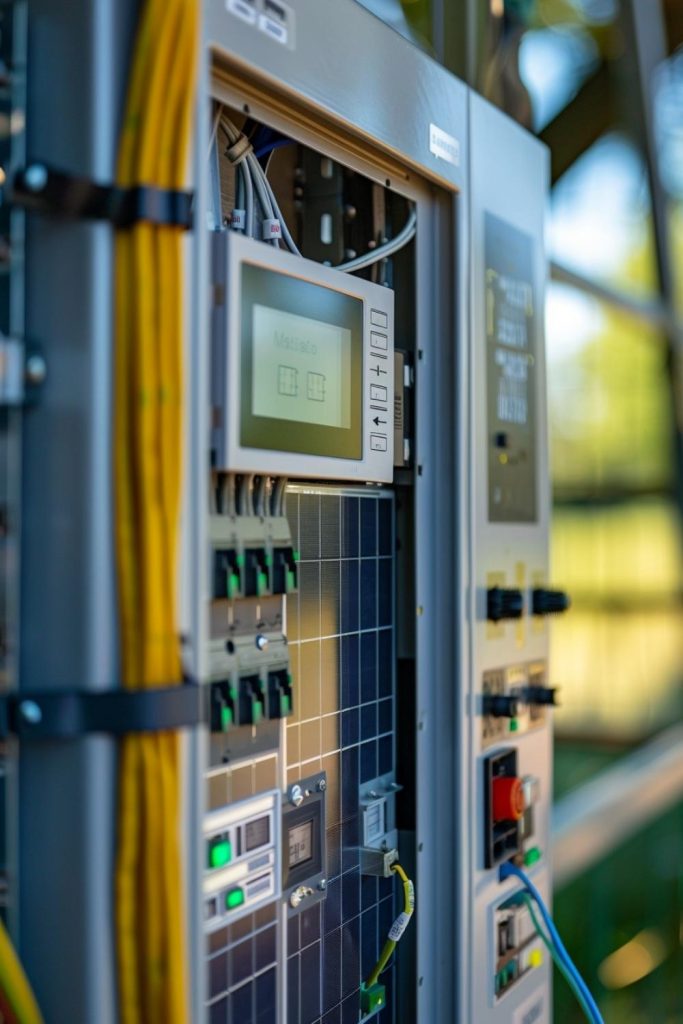
To effectively track the performance of your home solar energy system, monitoring system expenses play an essential role in ensuring efficiency and reliability. Investing in monitoring technologies and software solutions allows for real-time reporting, predictive maintenance, and accurate performance tracking.
These systems integrate sensors with high accuracy to provide valuable data analytics for peak energy management. Remote monitoring capabilities enable you to keep an eye on your system’s performance from anywhere, enhancing overall efficiency.
| Monitoring System Expenses | Description |
|---|---|
| Monitoring Technologies | Utilize advanced sensors for accurate data collection |
| Data Analytics | Analyze system performance for enhancement |
| System Integration | Integrate monitoring tools with existing systems |
| Remote Monitoring | Monitor system performance from anywhere |
Maintenance and Repairs
Regular maintenance and timely repairs are essential for maximizing the efficiency and longevity of your solar energy system. To guarantee your system operates at its best, consider the following key points:
- Preventive Maintenance: Regularly schedule checks and cleanings can help prevent major issues.
- Repair Frequency: Address any malfunctions promptly to avoid further damage.
- Warranty Coverage: Understand what components are covered by warranties to save on repair costs.
- Service Contracts: Consider investing in service contracts to have professionals handle maintenance and repairs efficiently.
- Monitoring System Performance: Regularly monitoring energy production levels can help identify any potential issues early on.
Efficiency and Performance Factors
When it comes to solar energy production, understanding efficiency factors and performance considerations is essential in maximizing the output of your system.
Efficiency factors encompass aspects like the type of solar panels used, their placement, and the condition of the system over time.
For optimal performance, monitoring the system’s output regularly helps in assessing the impact of factors like conversion rate on energy generation.
Efficiency Factors
Boosting efficiency and performance in solar energy production is essential for maximizing output and reducing costs. When considering efficiency factors in solar energy production, several key aspects play a vital role:
- Panel Orientation: Ensuring ideal alignment of solar panels towards the sun for maximum exposure.
- Shading Effects: Minimizing any obstructions that could cast shadows on panels and decrease efficiency.
- Installation Angle: Setting the right tilt angle for panels to capture sunlight efficiently throughout the day.
- Temperature Impact: Managing heat levels to prevent performance degradation and maintain efficiency ratings.
Performance Considerations
Enhancing the overall performance of solar energy systems involves a strategic focus on key efficiency and performance factors. To maximize the output and effectiveness of your solar energy system, consider the following performance considerations:
1. Solar Energy Efficiency: Improving the efficiency of solar panels directly impacts the amount of energy generated. Look for high-efficiency solar panels with a better energy conversion rate to improve performance.
2. Performance Enhancement: Regular maintenance and cleaning of solar panels are essential to guarantee peak performance. Keep an eye on shading issues, panel orientation, and tilt angles to maximize sunlight absorption.
3. Monitoring Systems: Implement monitoring systems to track the performance of your solar energy system. This allows you to identify any issues promptly and make necessary adjustments to enhance efficiency.
Financial Incentives and Rebates
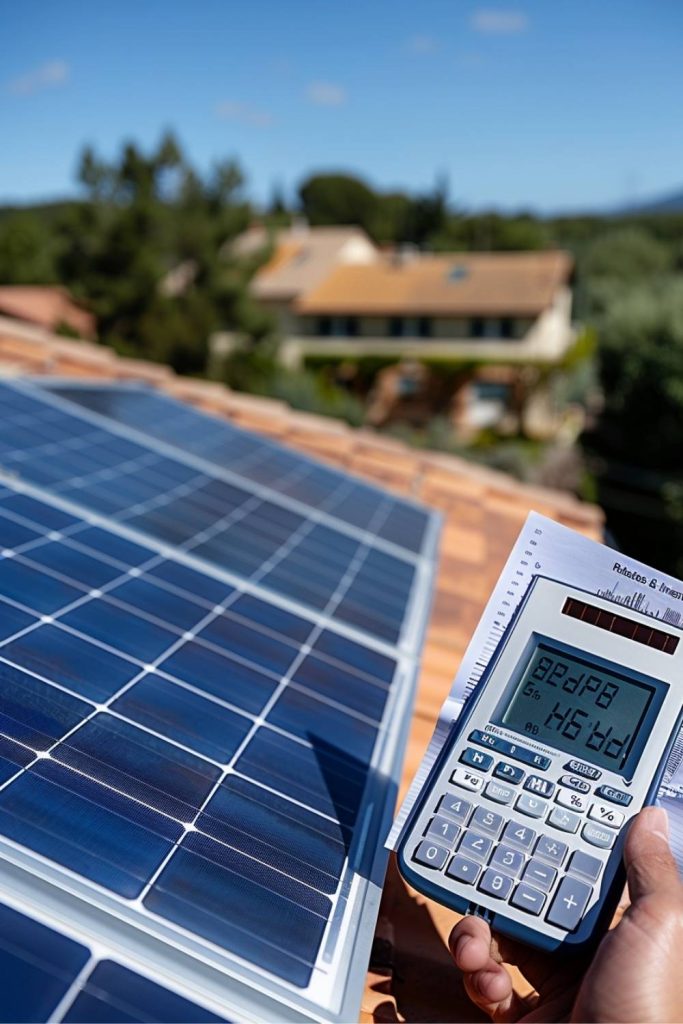
Financial incentives and rebates play an essential role in making solar energy more affordable for consumers. There are various ways in which these incentives can help you save money and make the switch to solar power a more feasible option:
- Tax Credits: Taking advantage of tax credits can considerably reduce the upfront cost of installing a solar energy system.
- State Incentives: Many states offer their own incentives to promote renewable energy adoption, further lowering the overall cost.
- Federal Subsidies: Federal subsidies can provide additional financial support, making solar energy more accessible to a wider range of consumers.
- Utility Rebates: Some utility companies offer rebates for installing solar panels, contributing to cost savings over time.
Conclusion
In summary, the cost of producing 1 kW of solar energy varies based on multiple factors such as panel costs, installation charges, and maintenance expenses. However, with the right financial incentives and rebates, the overall investment can be considerably reduced.
Remember, maximizing efficiency and performance can help lower long-term costs and increase the sustainability of your solar energy system. Consider all aspects carefully before making your decision to guarantee a successful and cost-effective investment.

